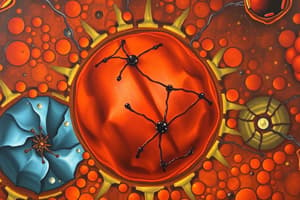Podcast
Questions and Answers
What role does UDP-glucose play in glycogen synthesis?
What role does UDP-glucose play in glycogen synthesis?
- It inhibits glycogen synthase.
- It initiates the glycogen chain.
- It acts as a branching enzyme.
- It serves as a suitable glucose donor. (correct)
Glycogenin directly creates $\alpha$1-6 branches in the glycogen molecule.
Glycogenin directly creates $\alpha$1-6 branches in the glycogen molecule.
False (B)
How does glucose-6-phosphate affect glycogen synthase and phosphorylase b, and what is the overall effect on glycogen metabolism?
How does glucose-6-phosphate affect glycogen synthase and phosphorylase b, and what is the overall effect on glycogen metabolism?
Glucose-6-phosphate activates glycogen synthase b and inhibits phosphorylase b, promoting glycogen synthesis and inhibiting glycogen degradation.
When glycogen synthase is __________, it is active and in the a form.
When glycogen synthase is __________, it is active and in the a form.
Match the following hormones with their effect on glycogen synthesis:
Match the following hormones with their effect on glycogen synthesis:
What is the primary function of protein kinase A in the regulation of glycogen synthesis?
What is the primary function of protein kinase A in the regulation of glycogen synthesis?
Insulin promotes glycogen synthesis by directly activating protein kinase A.
Insulin promotes glycogen synthesis by directly activating protein kinase A.
What enzyme carries out the dephosphorylation of glycogen synthase?
What enzyme carries out the dephosphorylation of glycogen synthase?
In muscle, PP1 is usually __________ and localized to glycogen, facilitating glycogen synthesis.
In muscle, PP1 is usually __________ and localized to glycogen, facilitating glycogen synthesis.
Match the state of phosphorylase a with its effect on PP1 activity in the liver:
Match the state of phosphorylase a with its effect on PP1 activity in the liver:
How does increased glucose concentration in the liver affect glycogen synthesis?
How does increased glucose concentration in the liver affect glycogen synthesis?
In type I diabetes, the primary issue is the unresponsiveness of organs to insulin signaling.
In type I diabetes, the primary issue is the unresponsiveness of organs to insulin signaling.
What is the role of glycogenin in glycogen synthesis?
What is the role of glycogenin in glycogen synthesis?
The enzyme that creates $\alpha$1-6 branches in glycogen is called __________ enzyme.
The enzyme that creates $\alpha$1-6 branches in glycogen is called __________ enzyme.
Match the type of diabetes with the corresponding issue in glycogen metabolism:
Match the type of diabetes with the corresponding issue in glycogen metabolism:
In what form is glycogen synthase when it is phosphorylated and inactive?
In what form is glycogen synthase when it is phosphorylated and inactive?
The effect of phosphorylation on glycogen synthase is the same as its effect on glycogen phosphorylase.
The effect of phosphorylation on glycogen synthase is the same as its effect on glycogen phosphorylase.
How does epinephrine signaling in muscle affect PP1 activity, and what is the downstream consequence?
How does epinephrine signaling in muscle affect PP1 activity, and what is the downstream consequence?
In type II diabetes, organs responsible for glycogen synthesis no longer respond to __________ signaling.
In type II diabetes, organs responsible for glycogen synthesis no longer respond to __________ signaling.
What is the glycosidic bond formed by the branching enzyme when creating a branch in glycogen?
What is the glycosidic bond formed by the branching enzyme when creating a branch in glycogen?
Flashcards
UDP-glucose
UDP-glucose
A nucleotide sugar, synthesized from glucose 1-phosphate and UTP, that donates glucose for glycogen synthesis.
Glycogenin
Glycogenin
A protein that initiates glycogen synthesis by attaching the first glucose molecule to itself and extending the sugar chain.
Glycogen synthase
Glycogen synthase
Enzyme that extends the glycogen chain after glycogenin's initial activity.
Branching enzyme
Branching enzyme
Signup and view all the flashcards
Glycogen synthase b
Glycogen synthase b
Signup and view all the flashcards
Glycogen synthase a
Glycogen synthase a
Signup and view all the flashcards
Glucagon and Epinephrine
Glucagon and Epinephrine
Signup and view all the flashcards
PP1 (Protein Phosphatase 1)
PP1 (Protein Phosphatase 1)
Signup and view all the flashcards
PP1 regulation in muscle
PP1 regulation in muscle
Signup and view all the flashcards
PP1 regulation in liver
PP1 regulation in liver
Signup and view all the flashcards
Type I diabetes
Type I diabetes
Signup and view all the flashcards
Type II diabetes
Type II diabetes
Signup and view all the flashcards
Study Notes
- Glycogen synthesis requires a suitable glucose donor, specifically the nucleotide sugar UDP-glucose.
- UDP-glucose is synthesized from glucose 1-phosphate and UTP.
- Glycogenin initiates the glycogen chain by attaching the first glucose molecule to itself, extending the chain to approximately 8 glucose molecules.
- Glycogen synthase further extends the chain.
- Branching enzyme creates a1-6 branches by removing part of the existing chain and reattaching it to the main chain via an a1-6 glycosidic bond.
- Glycogen synthase regulates glycogen synthesis.
- Regulation is reciprocal to glycogen degradation, involving allosteric modulation and covalent modification.
- Glucose-6-phosphate activates glycogen synthase b but inhibits phosphorylase b.
- Glycogen synthase exists in a and b forms.
- When phosphorylated, glycogen synthase is inactive and in the b form.
- When dephosphorylated, glycogen synthase is active and in the a form.
- Phosphorylation of glycogen synthase is opposite to that of glycogen phosphorylase.
Regulation via Kinases and Phosphatases
- Protein kinase A phosphorylates glycogen synthase, inhibiting glycogen synthesis; protein kinase A is activated by glucagon and epinephrine.
- Glycogen synthase kinase phosphorylates glycogen synthase and is inhibited by insulin, thus insulin promotes glycogen synthesis.
- PP1 dephosphorylates glycogen synthase.
PP1 Regulation in Liver and Muscle
- In muscle, PP1 is active and localized to glycogen, promoting glycogen synthesis; hormones like glucagon and epinephrine activate protein kinase A, leading to phosphorylation of G™ and other PP1 inhibitors, inhibiting PP1 activity.
- In liver, PP1 is inhibited by association with R state phosphorylase a; increased glucose converts phosphorylase a to the T state, releasing PP1 to dephosphorylate both phosphorylase and glycogen synthase, increasing glycogen synthesis.
Diabetes Mellitus Implications
- Glycogen metabolism through insulin is central to diabetes mellitus.
- Type I diabetes involves a lack of insulin production, leading to reduced glycogen synthesis.
- In type II diabetes, there is both decreased insulin production and a lack of response to insulin signaling in organs responsible for glycogen synthesis, such as the liver and skeletal muscle, despite insulin still being produced.
Studying That Suits You
Use AI to generate personalized quizzes and flashcards to suit your learning preferences.




